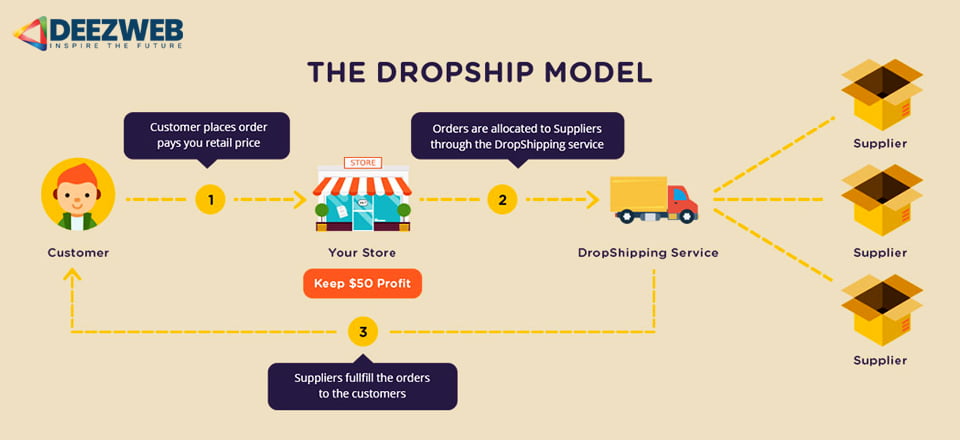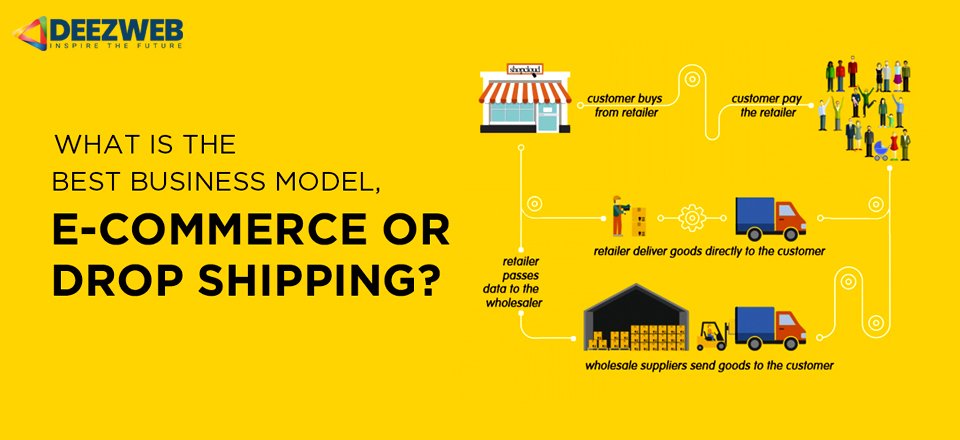Deezweb Internet Marketing is one of the prominent and Leading ECommerce Website Development and Designing Companies in Delhi NCR. At Deezweb Internet Marketing, we provide services in varied spheres of technology including Website Designing, Digital Marketing, ECommerce Solutions, Mobile Application Development, and PPC Management. We are also one of the best e-commerce Portal Designing Companies in Delhi and in India as well.
Conventional Types of Ecommerce Business Models:
What is E-commerce?
E-commerce stands for Electronic Commerce or Internet Commerce. ECommerce deals with the sale and purchase of goods and services online. It also comprises online money transactions and data exchange. The customer browses through the catalog of items or services available with the online seller, selects the item or service as per his/her requirement, provides delivery address details, and makes payment through the different payment options provided. Currently, ECommerce is a blooming industry bringing the world closer due to its wide reach. ECommerce has been classified into four categories based on the end-users of the application.
Four Traditional E-commerce Business Models.
Business to Business:
It refers to the online transaction between two businesses. The end customer is not a part of this ECommerce transaction.
In a B2B business model, a business offers its product or administration to another business. Here and there the purchaser is the end client, yet regularly the purchaser exchanges with the customer. The B2B model by and large means a more drawn-out deals cycle, however higher request worth, and all the more repeating buys. Ongoing B2B innovators have made a spot for themselves by supplanting indexes and request sheets with e-commerce customer-facing facades and improved focusing in specialty markets.
Business to Consumer:
It refers to the online transaction between a business and a customer directly.
B2C organizations offer to their end clients. B2C is the most well-known business model, so there are numerous remarkable methodologies under this umbrella. Anything you purchase online as a purchaser — think closet, family supplies, amusement — is done as a major aspect of a B2C exchange.
The basic leadership process for a B2C buy is a lot shorter than a business-to-business (B2B) buys, particularly for things that have lower esteem. Consider it: it’s a lot simpler for you to choose another pair of sneakers than for your organization to vet and buy another email specialist co-op or nourishment food provider.
Due to this shorter deals cycle, B2C organizations normally spend less showcasing dollars to make a deal, yet besides having lower normal request esteem and fewer repeating requests than their B2B partners. What’s more, B2C doesn’t just incorporate products, however, benefits too. B2C trend-setters have utilized innovation like portable applications, local promoting, and re-marketing to showcase legitimately to their clients and make their lives simpler simultaneously.
Consumer to Consumer:
It refers to the online selling and buying of used goods between two customers. No company is part of this transaction.
A C2C business associates buyers to trade products and enterprises and normally make their cash by charging exchange or listing expenses. Organizations like Craigslist and eBay spearheaded this model at the beginning of the web. C2C organizations profit by self-moved development by spurred purchasers and merchants, however, they face a key test in quality control and innovation upkeep. Pioneers like GOAT have made novel answers for quality control, and Depop has utilized online life for quick C2C development.
Envision a business model where you should simply make an e-commerce brand and spotlight on selling stuff while an outsider handles the stock, delivery, and fulfillment.
Likewise? You don’t pay for the product until the client puts in a request for it. Dropshipping is an online business model with likely minimal hindrances to the section which pulls in learners and experts the same to choose a specialty, make a brand, market, and profit. In case you’re new to this field of online business and need to find out about what is Dropshipping, how Dropshipping works, and how you can begin a Dropshipping business in 2021, you’re at the opportune spot. Here’s a finished guide clarifying everything about the Dropshipping business model.
Consumer to Business:
It refers to the online transactions between a customer and a business wherein a customer provides services to the business.
C2B organizations enable people to offer products and enterprises to organizations. In this e-commerce model, a webpage may enable clients to post the work they need to be finished and have organizations offered the chance. Member advertising administrations would likewise be considered C2B. Elance (presently Upwork) was early pioneers in this model by helping organizations enlist consultants.
The C2B e-commerce model’s focused edge is in evaluating merchandise and enterprises. This methodology enables shoppers to name their costs or have organizations straightforwardly contend to address their issues. Ongoing innovators have imaginatively utilized this model to associate organizations with social influencers to advertise their products.
Advantages of ECommerce:
ECommerce facilitates the sale and purchase of goods and services irrespective of the geographical location of the seller or the customer.
It ensures faster delivery of goods and services with minimal effort from the customer. The customer grievances are also sorted out faster.
The application is functional 24/7 and allows for an unperturbed shopping experience.
Disadvantages of ECommerce:
The cost involved in setting up and maintaining an ECommerce business is very high.
Security of customer information is another major concern that needs to be addressed in the ECommerce application.
Operational challenges like problems in shipping, wrong deliveries, late deliveries, etc. have to be taken care of in order to attain complete customer satisfaction.
What is dropshipping?
Dropshipping is an online business model dependent on a request fulfillment system where the vendor records products on his site, markets them, and takes the requests under his image yet doesn’t keep stock or handle the delivery and fulfillment of the product. Or maybe, it buys the product from the outsider when a client makes a buy and makes them dispatch legitimately to the client. A case of a Dropshipping site could be an e-commerce store managing in automatons and automaton extras. The store takes the requests under its very own image yet the real delivery is conveyed by Aliexpress.
Dropshipping refers to the business model wherein the business fulfills the order without keeping the goods in stock. When the customer places an order for a product with the business, the order is redirected to a supplier who in turn supplies the ordered goods. In short, dropshipping simply facilitates a commercial transaction between a supplier and a customer. It provides suppliers extra business with minimal cost and effort. However, the dropshipping company’s reputation is completely dependent on the quality of the goods or services provided by the supplier. Therefore, it is very essential for the business to find the right suppliers providing quality goods/services at affordable prices.

Advantages of Dropshipping:
Minimal investment is required to start the business as no products and inventory are purchased beforehand.
The business can be run from any geographical location with an internet connection. The retailer should be in contact with the supplier and the customer all the time in order to manage his/her business effectively.
A wide variety of products can be offered to potential customers as the products need not be physically available with the business at that point in time.
The scalability of the dropshipping business is easy and the load is shared by the suppliers.
A Dropshipping store looks precisely like some other conventional e-commerce store yet doesn’t bear every one of the dangers engaged with running an online business store.
Dropshipping is easy to start, manage, and grow
To begin a beneficial Dropshipping business, you should simply locate a gainful and not focused specialty, a great provider, a site, and some advertising aptitudes. You don’t require a stockroom to store the things or associations with the conveyance organizations to deal with the fulfillment. All that is finished by the provider you’ll arrange from.
Dropshipping involves very less investment
The majority of the venture a Dropshipping store requires is through promoting and marking. This speculation is only the extent of what an undeniable e-commerce store that additionally handles fulfillment requires.
The area of the merchant doesn’t affect the business
You could be sitting in your condo in India while your clients from the US request the products which will be satisfied with China. Your area doesn’t generally make a difference as you don’t deal with the conveyance.
Dealer doesn’t have to deal with the unsold inventory
As you don’t need to manage the genuine product, there’s no weight on the most proficient method to manage the unsold stock.
Dropshipping involves very fewer losses
Regardless of whether your Dropshipping business neglects to get footing and more deals, you won’t endure a lot of misfortune as there was very little interest in any case.
How dropshipping function?
The Dropshipping procedure is extremely straightforward. You’ve just gotten a review of how Dropshipping functions, yet here’s a definite clarification for you to show signs of improvement comprehension and dispatch your very own Dropshipping store.
Disadvantages of Dropshipping:
The profit margins in the dropshipping business are minimal due to heavy competition in the market.
As the business does not maintain its own inventory, it becomes difficult to manage and keep track of the inventory obtained from the supplier.
The shipping issues and charges should be discussed with the suppliers from time to time.
If the quality of the products provided by a supplier is low, the business needs to take responsibility for the same in case of a customer complaint.

Difference between ECommerce business and a Dropshipping business.
ECommerce Marketplaces are specifically consumer-centric businesses where different brands can market and sell their products along with other brands. However, the Dropshipping business focuses on marketing specific goods from different suppliers by the retailers.
ECommerce Marketplaces have a specific quantity of goods in stock. They carry out detailed market research and zero in on the number of products and the inventory to be maintained at any given time. Dropshipping businesses do not maintain any products or inventory till an order is received.
The initial capital investment for an ECommerce business is quite high compared to the Dropshipping business. ECommerce businesses invest in warehouses for product storage, inventory, etc. Dropshipping businesses do not invest in any of these and hence it is a low investment business.
ECommerce businesses have higher profit margins compared to Dropshipping businesses. Once the business gets a clear idea of the demand for a specific product, it can reduce its money spent on stock accordingly and hence maximize profits.
The ECommerce business has greater control over the order fulfillment process as it allows the business to customize its services offered to the customer. However, in the Dropshipping business, the retailer has no control over the speed, cost, and quality of the services provided as it is taken care of by the respective supplier.
Although there are a number of pros and cons for both ECommerce and Dropshipping business, it is not a wise decision to enter into the dropshipping business without proper market research. It is very important to have a number of suppliers who adhere to high standards. As the retail dropshipping business is responsible for customer interaction, it is answerable to the customer in case of any grievance. Customer care service is another issue that should be discussed with the suppliers when starting the business. The business should also ensure that the suppliers maintain certain stock so that order fulfillment is possible at any given time.
In conclusion, dropshipping can be profitable for suppliers, retailers, and customers if it is implemented in a well-designed manner. If you are contemplating, getting into the dropshipping business, it is advisable to not get into dropshipping completely but to use the model as a part of a larger ECommerce retail model in order to get more customers.
